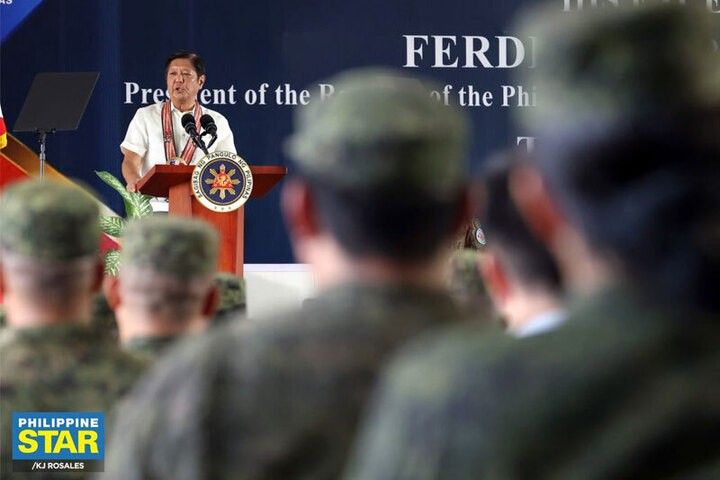Marcos Jr. approves military procurement ‘wish list’

MANILA, Philippines — Amid continuing maritime aggression by China, President Marcos has approved a $35-billion budget to modernize the Armed Forces of the Philippines (AFP), with the Philippine Navy getting the largest chunk to strengthen capabilities in the West Philippine Sea (WPS).
The budget will be used to finance various acquisitions enumerated in a lengthy “wish list” submitted by the AFP to the President, and will be spread out over 10 years, Philippine Navy spokesman for the WPS Commodore Roy Vincent Trinidad said yesterday at the Kapihan sa Manila Bay news forum.
“As to the proportion, I would say that the larger chunk goes to the Navy, and then the Air Force, and then the Army, and then the General Headquarters. Because the thrust now is already external. It says there that there are different capabilities that will allow the Philippine Navy to fight across a broad spectrum of warfare,” he said.
Trinidad explained that broad spectrum warfare refers to air, surface, sub-surface and electronic spectrum.
“So our ships or our capabilities, including those on land, should have the capability to fight in the air, on land, on surface, at sea and sub-surface undersea, and of course in the electronic spectrum,” he said.
“The details of this are with the Department of National Defense and they will determine which will be prioritized, where and how will it be acquired and how it will be developed. Will it be bought? Will it be manufactured locally, so that the local labor force can be utilized and the money will be spent here? So we are thankful that the AFP is fully supported,” he added.
Asked if the Philippine Navy is still looking to acquire a submarine, Trinidad did not say if it was included in the wish list but noted that it is still part of the plan.
“The project is still there for undersea warfare capabilities. When you say undersea warfare, there are a lot of components to it, not just a submarine. These include support components that are on the surface like our bases and the training of our personnel,” he said.
Trinidad said the Philippine fleet already has a submarine group, which has sent officers and enlisted personnel locally and abroad for training.
“Modernization will always start in the mind. If our minds are outdated, even if we have new technology we still cannot use those,” he said, adding that they invest in young ensigns, junior officers and lieutenant junior grades.
More aggressive
While there were no reported casualties during China’s latest aggression at Panatag Shoal, Philippine Coast Guard (PCG) spokesman for WPS Commodore Jay Tarriela said that China has become more aggressive.
According to reports, Tarriela said, “The CCG now has elevated the tension and the level of their aggression as well towards the PCG vessel.”
“This is the first time that we can say that a PCG vessel has been subjected to a direct water cannon with that kind of pressure that even resulted in structural damage of the PCG (vessel),” he added.
Tarriela said the PCG’s BRP Bagacay’s railing and canopy were damaged when hit by a Chinese vessel, while the Bureau of Fisheries and Aquatic Resources (BFAR)’s BRP Bankaw’s starboard stern was hit by the CCG’s water cannon.
He estimated that the pressure from the water cannon went beyond the fatal 200 pounds per square inch of pressure.
BFAR spokesman Nazario Briguera in a radio interview noted that in the past, the CCG only resorted to high-pressure water cannon but now there were multiple instances of ramming of vessels.
He added that among the damage incurred by the ship were on the radio system and electrical navigation.
Tarriela believed that this was China’s response to the “David and Goliath” narrative wherein the Philippines is the David in this scenario.
“It just goes to show that Goliath is becoming more Goliath,” he said.
But this is part of the Philippines’ transparency strategy that prompted China to show its real face and true character as a bully country, which Tarriela said is still a victory of their transparency strategy.
Will not engage
Despite the continued aggression displayed by China, he said they would not be the cause for the escalation of tension in the WPS.
“We would not be the reason to be an excuse for the Chinese government to bring in their warships and elevate the tension, wherein they would claim that we started the war and so they brought in their warships. This is the reason why we have a calibrated approach in maintaining our presence in the WPS,” Tarriela said.
For his part, Trinidad said they would continue exercising their mandate to patrol the area, resupply the troops and fisherfolk and rotate personnel.
“This is what we call below the threshold of conflict. This is child’s play where they will repeatedly trigger you until you attack first, and then you lose,” Trinidad said, pointing out that China behaves the same way with India and Korea in their common borders.
Trinidad said the military is happy that the government has a strong stand on the issue because those who should benefit from Philippine waters are the Filipinos and the fisherfolk.
According to him, last Tuesday’s water cannon attack was on a humanitarian mission that still succeeded in providing water, fuel and food supplies to Filipino fishermen in the area.
Asked if statements of support from foreign nations are enough or may just be all talk, Trinidad said international support is very important to the Philippines.
“We are on the right side. That’s why we ensure that what our soldiers do at sea, whether navy, coast guard, BFAR, etc., all the players of the maritime domain, all our actions must be within the bounds of international law,” he said.
Condemnation
China’s water cannon attacks on Philippine vessels and dangerous actions in WPS have sparked international condemnation.
The US slammed yesterday China’s repeated harassment of Philippine vessels in the WPS as Washington warned that it is “detrimental” to regional peace and security.
The State Department also called out China’s installation of barriers in Philippine waters.
“Our belief is that the CCG installation of these barriers also endangers Philippine fisherfolk’s livelihoods and prevents them from exercising their legal rights to fish in those waters,” State Department principal deputy spokesperson Vedant Patel said at a press briefing.
Meanwhile, United States Defense Secretary Lloyd Austin III will host a quadrilateral meeting with Defense Secretary Gilberto Teodoro and their Japanese and Australian counterparts this week to discuss ways to strengthen security among the four nations, the US Department of Defense announced.
Secretary of State Antony Blinken said he made clear during his visit to China last week that the US will continue to work to de-escalate tensions and the US defense commitments to the Philippines remain ironclad.
The United Kingdom reiterated its call for “respect for the UN Convention on the Law of the Sea (UNCLOS) and adherence to the 2016 Arbitral Award, which is legally binding on the parties.”
Canada also expressed concern over China’s actions and the use of water cannon through Canadian Ambassador David Hartman’s post on X.
Japanese Ambassador Kazuya Endo posted that “Japan is concerned about the recent incident around Scarborough Shoal” which he said undermined safety.
The European Union and France expressed concern, saying CCG’s use of water cannon is against international law and a threat to safety of life at sea.
Germany also reiterated its call for the respect of UNCLOS and the peaceful resolution of conflicts, while Australian Ambassador HK Yu said China’s dangerous maneuvers and obstruction encountered by Philippine vessels “create risks of miscalculation and endanger peace. Disputes must be resolved peacefully under UNCLOS.”
No meddling
Rep. Ramon Rodrigo Gutierrez expressed support for Cagayan Rep. Joseph Lara who initiated a House probe on the surge of Chinese students in Cagayan after the Chinese embassy criticized Lara for “inciting suspicion and hatred of China” and insinuating Sinophobia.
“For the Chinese embassy to issue a statement directly attacking the inquiry and the motives Congressman Lara has, is this the non-interference that China espouses?” Gutierrez said.
“Why does the embassy of China presume to have the authority to tell us, the representatives of the Filipino people, our motives? We take exception to this statement,” he added.
“It should be noted, that at issue here isn’t any law passed by Congressman Lara. It isn’t even a proposed bill. There is no government policy or program questioned. It was simply a resolution seeking an inquiry into what the good congressman sees as a cause of concern within his district.” – Evelyn Macairan, Pia Lee-Brago, Bella Cariaso, Delon Porcalla
- Latest
- Trending





























